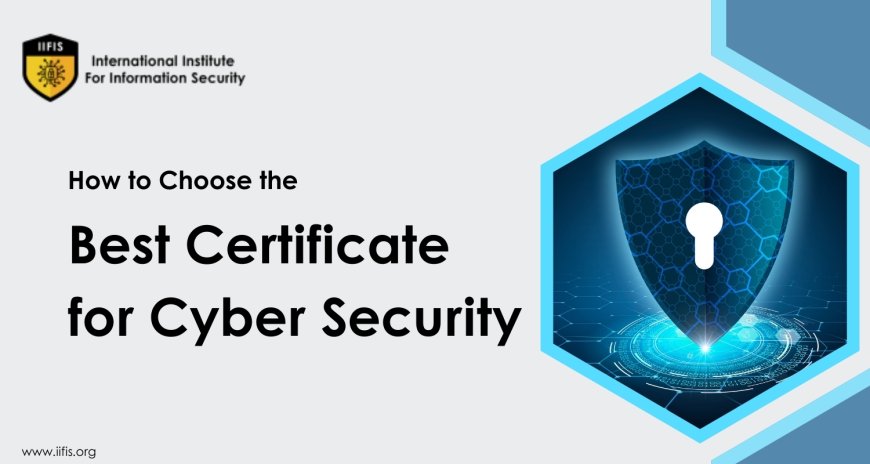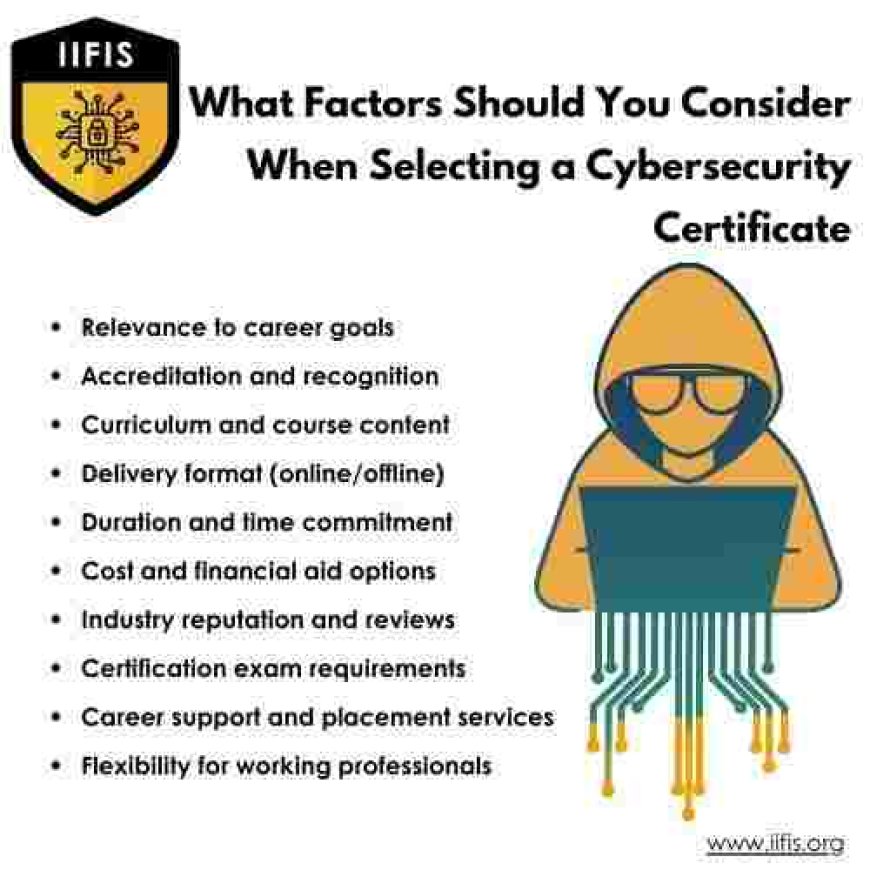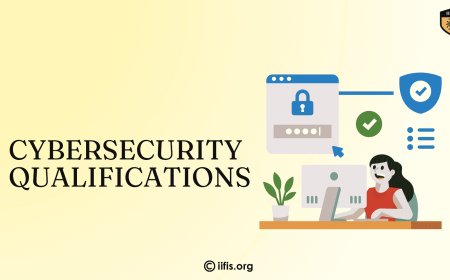How to Choose the Best Certificate for CyberSecurity
Learn how to choose the best certificate for cybersecurity. Discover key factors, top programs, and tips to select the right certification for your career growth.

Cyber security certifications come in different types, like Information Security Certifications, Network Security Certification Programs, and Application Security Certification, each focusing on specific areas of cyber defense. Choosing the right cyber security certificate involves a few key things. First, think about your career goals and what skills you want to learn. For example, if you want to secure networks, a Network Security Certification Program would be ideal. If you're more into securing software, then an Application Security Certification might be better.
Next, consider where the certification comes from. Certifications from well-known organizations that have high standards are usually more respected by employers. It's also important to pick a certification that stays current with industry trends and new technology, so that what you learn stays useful. By picking the best certificate for cyber security that matches your career goals and what employers are looking for, you can boost your skills and help protect digital information from cyber threats.
Choosing the Best Certificate for Cybersecurity
Choosing the right cybersecurity certification is crucial. A strong security foundation helps businesses protect their sensitive data and systems from new threats. Whether you want to be an information security expert, certified penetration tester, cybersecurity associate, or certified cybersecurity manager, your certification choice shapes your skills and career in cybersecurity.
The best cybersecurity certificate provides thorough training in risk management, ethical hacking, responding to incidents, and meeting industry standards. It teaches professionals to find vulnerabilities, manage risks, and set up effective security. Employers value certified professionals who can defend against cyber threats, making these certifications important for career growth.
Understanding the differences between certifications like certified penetration tester and cybersecurity associate helps professionals match their skills with what employers need. Choosing the best certificate for cybersecurity doesn't just boost technical skills but also proves expertise, giving employers and clients confidence. Making the right choice keeps professionals ahead in cybersecurity, helping protect digital systems worldwide.
Challenges in Choosing the Best Cybersecurity Certification
Selecting the right cybersecurity certification can feel overwhelming because there are so many options to choose from. Here are some main challenges:
1. Many Options to Pick From: The cybersecurity certification market offers a lot of choices. Each certification claims to be the best certificate for cybersecurity. This variety can confuse people who are trying to figure out which certifications are the most valuable.
2. Relevance and Depth of Skills: Another challenge is figuring out if a certification really gives you the skills you need for cybersecurity. Some certifications cover a wide range of topics but only at a surface level. Others focus deeply on specific areas. This makes it hard to know which one matches your career goals best.
3. Recognition and Reputation in the Industry: How much other people in the cybersecurity industry respect a certification is also important. People trying to get certified often struggle to figure out which certifications are well-known and trusted in the industry. This recognition affects job opportunities and career growth.
4. Cost and Time: Choosing the best certificate for cybersecurity also means thinking about how much it costs and how long it takes. Some certifications cost a lot of money and need months of studying. This can be hard for people to manage, both financially and with their time.
To handle these challenges, it helps to do thorough research, talk to experts in the field, and think about how each certification matches your career goals. By dealing with these challenges, people can make smart choices to move forward in their cybersecurity careers effectively.
How Can You Choose the Best Certificate for Cybersecurity?
1. Know Your Career Goals: Decide if you want to specialize in a specific area of cybersecurity, like network security, ethical hacking, or cloud security. This helps you pick a certificate that matches your career goals.
2. Check What Employers Want: Research which cybersecurity certifications are most valued in the industry right now. Look for certificates that are recognized worldwide and highly respected by employers.
3. Choose the Right Level: Cybersecurity certificates come in different levels, from beginner to advanced. Pick one that matches your experience. For beginners, certificates like CompTIA Security+ or Certified Ethical Hacker (CEH) are good starting points. If you're more experienced, you might aim for advanced ones like Certified Information Systems Security Professionals (CISSP).

4. Look at the Course Content and Exams: Make sure the certificate program covers topics that are relevant to your career goals. Check the exam details, like prerequisites and format, to understand what's required to get certified.
5. Explore Training Options: There are different ways to prepare for cybersecurity certifications, such as online courses, boot camps, or self-study materials. Choose a method that suits how you like to learn and fits your schedule.
6. Check for Accreditation: Look for certifications that are accredited by well-known organizations in the cybersecurity field. Accreditation adds credibility and ensures the certificate meets industry standards.
7. Consider Renewal Requirements: Some cybersecurity certifications need to be renewed periodically or require continuing education. Think about the renewal process and ongoing requirements when choosing a certification.
8. Get Advice from Experts: Talk to cybersecurity professionals or mentors in your network for advice on picking the right certificate for your career. Their insights can help you make a well-informed decision.
By following these steps, you can choose the best certificate for cybersecurity that matches your career goals and meets industry demands.
Steps to Choosing the Best Cybersecurity Certificate
Selecting the right cybersecurity certificate can greatly enhance your career prospects in the field. Here’s a straightforward guide to help you make this important decision:
1. Understand Your Career Goals: Start by clarifying what you want to achieve in cybersecurity. Whether you're interested in ethical hacking, network security, or managing cyber risks, knowing your career goals will guide your certificate choice.
2. Research Accredited Programs: Look for well-known institutions or organizations that offer cybersecurity certificates. Make sure the program is accredited by recognized bodies in the industry to ensure its quality and acceptance.
3. Review Curriculum and Specializations: Check out the courses offered in each program and see if they match your career goals. Look for specific topics like incident response, penetration testing, or cryptography that are relevant to your interests.
4. Consider Hands-On Learning: Practical experience is crucial in cybersecurity. Choose programs that provide hands-on labs, simulations, or real-world projects. These opportunities not only improve your skills but also give you valuable experience for future roles.
5. Check Instructor Expertise and Support: Look into the qualifications and industry experience of the instructors. Experienced cybersecurity professionals can offer valuable advice and support. Also, consider the availability of tutoring or career counseling services.
6. Assess Certification Requirements and Recognition: Understand what you need to qualify for certification and how recognized it is in the industry. Certificates acknowledged by major cybersecurity organizations and employers will enhance your credibility and job prospects.
7. Compare Costs and Financial Aid: Evaluate the total expenses of the program, including tuition and materials. Research financial aid options such as scholarships or employer sponsorship. Consider the program's return on investment in terms of career advancement.
8. Read Reviews and Get Feedback: Look for reviews and testimonials from current or past students. Honest feedback can provide insights into the program's strengths and areas needing improvement.
9. Stay Updated with Industry Trends: Cybersecurity is always changing. Choose a certificate program that covers the latest technologies and practices. Programs aligned with current industry standards will equip you with relevant skills sought after by employers.
By following these steps, you can confidently choose the best certificate for cybersecurity that matches your career goals. For more information on cybersecurity certificates and career guidance, visit IIFIS.
Picking the best cybersecurity certificate depends on your career goals, how much you already know, and what employers are looking for. Certifications like CISSP, CEH, and CompTIA Security+ are well-respected and cover a lot of topics that businesses care about. Whether you want to be a manager, an ethical hacker, or just learn the basics of security, choosing the right certification can match your skills with what's happening in the cybersecurity field right now. This can make you more trustworthy and open up better job opportunities in cybersecurity.
























